| Listing 1 - 10 of 10 |
Sort by
|
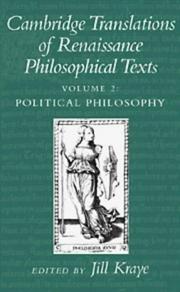
ISBN: 0521597722 0521592089 Year: 1997 Publisher: Cambridge Cambridge University press
Abstract | Keywords | Export | Availability | Bookmark
 Loading...
Loading...Choose an application
- Reference Manager
- EndNote
- RefWorks (Direct export to RefWorks)
Ancient ethics --- Antieke ethiek --- Ethics [Ancient ] --- Ethiek [Antieke ] --- Ethiek van de Oudheid --- Ethique de l'Antiquité --- Etres humains --- Homme (Humanité) --- Hommes (Humanité) --- Human beings --- Humanité (Ensemble des êtres humains) --- Humans --- Mankind --- Mens --- Mensdom --- Mensen --- Mensheid (Geheel der mensen) --- Ethics --- Political science --- Philosophy --- Filosofie ; vertalen ; renaissance --- Filosofische teksten ; vertalen ; renaissance --- Filosofie ; vertalen ; renaissance. --- Filosofische teksten ; vertalen ; renaissance. --- Administration --- Civil government --- Commonwealth, The --- Government --- Political theory --- Political thought --- Politics --- Science, Political --- Social sciences --- State, The --- Homo sapiens --- Human race --- Humanity (Human beings) --- Humankind --- Man --- People --- Hominids --- Persons
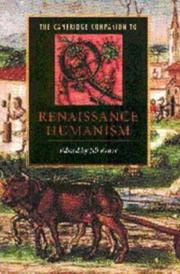
ISBN: 0521436249 0521430380 0511999267 9780521430388 9780511999260 9780521436243 Year: 1996 Publisher: Cambridge Cambridge University Press
Abstract | Keywords | Export | Availability | Bookmark
 Loading...
Loading...Choose an application
- Reference Manager
- EndNote
- RefWorks (Direct export to RefWorks)
From the fourteenth to the seventeenth century, humanism played a key role in European culture. Beginning as a movement based on the recovery, interpretation and imitation of ancient Greek and Roman texts and the archaeological study of the physical remains of antiquity, humanism turned into a dynamic cultural programme, influencing almost every facet of Renaissance intellectual life. The fourteen essays in this 1996 volume deal with all aspects of the movement, from language learning to the development of science, from the effect of humanism on biblical study to its influence on art, from its Italian origins to its manifestations in the literature of More, Sidney and Shakespeare. A detailed biographical index, and a guide to further reading, are provided. Overall, The Cambridge Companion to Renaissance Humanism provides a comprehensive introduction to a major movement in the culture of early modern Europe.
Humanism. --- Renaissance. --- Neo-Latin literature --- anno 1400-1499 --- anno 1500-1599 --- Humanism --- Humanisme --- Renaissance --- European literature --- Civilization, Modern --- Littérature européenne --- Civilisation moderne et contemporaine --- humanism --- Littérature européenne --- neo-Latin [language] --- History of civilization --- anno 1600-1699 --- Revival of letters --- Civilization --- History, Modern --- Civilization, Medieval --- Middle Ages --- Philosophy --- Classical education --- Classical philology --- Philosophical anthropology --- History --- Europe --- Intellectual life --- Vie intellectuelle --- Revival --- History & Archaeology --- History - General
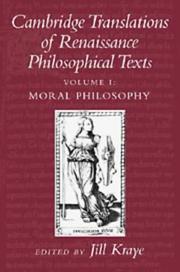
ISBN: 0521426049 0521415802 0511803044 Year: 1997 Publisher: Cambridge : Cambridge University Press,
Abstract | Keywords | Export | Availability | Bookmark
 Loading...
Loading...Choose an application
- Reference Manager
- EndNote
- RefWorks (Direct export to RefWorks)
The Renaissance, known primarily for the art and literature that it produced, was also a period in which philosophical thought flourished. This two-volume anthology contains 40 new translations of important works on moral and political philosophy written during the Renaissance and hitherto unavailable in English. The anthology is designed to be used in conjunction with The Cambridge History of Renaissance Philosophy, in which all of these texts are discussed. The works, originally written in Latin, Italian, French, Spanish, and Greek, cover such topics as: concepts of man, Aristotelian, Platonic, Stoic, and Epicurean ethics, scholastic political philosophy, theories of princely and republican government in Italy and northern European political thought. Each text is supplied with an introduction and a guide to further reading.
Arts and Humanities --- Philosophy --- Ethics --- Political science --- Human beings --- Homo sapiens --- Human race --- Humanity (Human beings) --- Humankind --- Humans --- Man --- Mankind --- People --- Hominids --- Persons --- Administration --- Civil government --- Commonwealth, The --- Government --- Political theory --- Political thought --- Politics --- Science, Political --- Social sciences --- State, The
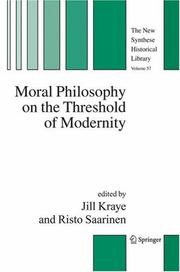
ISBN: 1402030002 9048167655 9786610263677 1280263679 1402030010 Year: 2005 Publisher: Berlin Springer
Abstract | Keywords | Export | Availability | Bookmark
 Loading...
Loading...Choose an application
- Reference Manager
- EndNote
- RefWorks (Direct export to RefWorks)
This volume investigates the paradigm changes which occurred in ethics during the early modern era (1350-1600). While many general claims have been made regarding the nature of moral philosophy in the period of transition from medieval to modern thought, the rich variety of extant texts has seldom been studied and discussed in detail. The present collection attempts to do this. It provides new research on ethics in the context of Late Scholasticism, Neo-Scholasticism, Renaissance Humanism and the Reformation. It traces the fate of Aristotelianism and of Stoicism, explores specific topics such as probabilism and casuistry, and highlights the connections between Protestant theology and early modern ethics. The book also examines how the origins of human rights, as well as different views of moral agency, the will and the emotions, came into focus on the eve of modernity. Target audience: students of medieval, Renaissance and Reformation history; students of the history of philosophy, ethics and theology; those interested in humanism, human rights and the history of law.
Moral philosophy. --- Ethics --- Ethics, Medieval. --- Political ethics --- Ethics, Medieval --- Medieval ethics
Book
ISBN: 9004429328 900442931X Year: 2020 Publisher: Leiden ; Boston : Brill,
Abstract | Keywords | Export | Availability | Bookmark
 Loading...
Loading...Choose an application
- Reference Manager
- EndNote
- RefWorks (Direct export to RefWorks)
Scholarship between Europe and the Levant is a collection of essays in honour of Professor Alastair Hamilton. His pioneering research into the history of European Oriental studies has deeply enhanced our understanding of the dynamics and processes of cultural and religious exchange between Christian Europe and the Islamic world. Written by students, friends and colleagues, the contributions in this volume pay tribute to Alastair Hamilton’s work and legacy. They discuss and celebrate intellectual, artistic and religious encounters between Europe and the cultural area stretching from Northern Africa to the Arabian Peninsula, and spanning the period from the sixteenth to the late nineteenth century. Contributors: Asaph Ben-Tov, Alexander Bevilacqua, Maurits H. van den Boogert, Charles Burnett, Ziad Elmarsafy, Mordechai Feingold, Aurélien Girard, Bernard Heyberger, Robert Irwin, Tarif Khalidi, J.M.I. Klaver, Noel Malcolm, Martin Mulsow, Francis Richard, G. J. Toomer, Arnoud Vrolijk, Nicholas Warner, Joanna Weinberg, and Jan Just Witkam.
Islam --- Relations --- Christianity. --- Europe --- Islamic countries --- Middle East --- Study and teaching
Book
ISSN: 09208607 ISBN: 9789004355019 9004355014 9004355324 Year: 2018 Volume: 273 Publisher: Leiden ; Boston : Brill,
Abstract | Keywords | Export | Availability | Bookmark
 Loading...
Loading...Choose an application
- Reference Manager
- EndNote
- RefWorks (Direct export to RefWorks)
Jill Kraye, Professor Emerita of the Warburg Institute, is renowned internationally for her scholarship on Renaissance philosophy and humanism. This volume pays tribute to her achievements with essays by friends, colleagues, and doctoral students-all leading scholars-on subjects as diverse as her work. Articles on canonical figures such as Marsilio Ficino and Justus Lipsius mix with more quirky pieces on alphabetic play and the Hippocratic aphorisms. Many chapters seek to bridge the divide between humanism and philosophy, including David Lines's survey of the way fifteenth-century humanists actually defined philosophy and Brian Copenhaver's polemical essay against the concept of humanist philosophy. The volume includes a full bibliography of Professor Kraye's scholarly publications.
Humanism. --- Philosophy, Renaissance. --- Humanisme --- Philosophie de la Renaissance --- Humanisme. --- Philosophie de la Renaissance. --- Humanism --- Philosophy, Renaissance
Book
ISBN: 904813076X 9048130786 9048130778 9400730802 9786612839320 1282839322 Year: 2010 Publisher: Dordrecht, Netherlands ; New York, N.Y. : Springer Verlag,
Abstract | Keywords | Export | Availability | Bookmark
 Loading...
Loading...Choose an application
- Reference Manager
- EndNote
- RefWorks (Direct export to RefWorks)
Scientia is the term that early modern philosophers applied to a certain kind of demonstrative knowledge, the kind whose starting points were appropriate first principles. In pre-modern philosophy, too, scientia was the name for demonstrative knowledge from first principles. But pre-modern and early modern conceptions differ systematically from one another. This book offers a variety of glimpses of this difference by exploring the works of individual philosophers as well as philosophical movements and groupings of the period. Some of the figures are transitional, falling neatly on neither side of the allegiances usually marked by the scholastic/modern distinction. Among the philosophers whose views on scientia are surveyed are Hobbes, Descartes, Spinoza, Gassendi, Locke, and Jungius. The contributors are among the best-known and most influential historians of early modern philosophy.
Knowledge, Theory of. --- Science -- Philosophy. --- Science --- Knowledge, Theory of --- Philosophy --- Philosophy & Religion --- Philosophy. --- Epistemology --- Theory of knowledge --- Normal science --- Philosophy of science --- Cultural heritage. --- History. --- Modern philosophy. --- History of Philosophy. --- History of Science. --- Modern Philosophy. --- History, general. --- Cultural Heritage. --- Psychology --- Philosophy (General). --- Philosophy, modern. --- Cultural heritage --- Cultural patrimony --- Cultural resources --- Heritage property --- National heritage --- National patrimony --- National treasure --- Patrimony, Cultural --- Treasure, National --- Property --- World Heritage areas --- Modern philosophy --- Annals --- Auxiliary sciences of history --- Mental philosophy --- Humanities
Book
ISBN: 9781908590565 1908590564 Year: 2019 Publisher: London The Warburg Institute
Abstract | Keywords | Export | Availability | Bookmark
 Loading...
Loading...Choose an application
- Reference Manager
- EndNote
- RefWorks (Direct export to RefWorks)
"This volume, containing the revised and expanded versions of eight papers originally presented at a workshop held at the Warburg Institute in June 2012, addresses the question of uncertainty in early modern scholarship and thought. This and other related concepts conventionally assigned to the sceptical tradition are identified and explored in the activity of scholars and editors, whose varying degree of philosophical awareness does not detract from the significance of their ways of conceiving, or coping with, textual uncertainty. The methods of the history of ideas and of classical scholarship are combined in an effort to bring out the methodological assumptions of specific philological projects, editorial strategies and technical devices, as well as to track their possible overlap and interplay with patterns of thought revolving around notions such as uncertainty and conjectural knowledge. The eight papers confront an array of problems, texts, scholars and intellectual contexts, from introductory assessments of the nature of Greek scepticism, particularly in its relation to ancient grammar and medieval thought, to in-depth analyses of the semantic family of uncertainty, as well as of the notion of divination; from case studies of the textual transmission, and relevant editorial problems, of Seneca and Lucretius, to explorations of larger debates in the area of biblical philology, with special attention paid to key figures such as Patrick Young, Richard Bentley and Anthony Collins."--Page 4 of cover.
Learning and scholarship --- Uncertainty --- Reasoning --- Erudition --- Scholarship --- Civilization --- Intellectual life --- Education --- Research --- Scholars --- History --- Classical philology --- Classical philology. --- Criticism, Textual --- Incertitude --- Knowledge, Theory of --- Knowledge, Theory of. --- Learning and scholarship. --- Philologie ancienne --- Philologie --- Philology --- Savoir et érudition --- Scepticisme --- Skepticism --- Skepticism. --- Théorie de la connaissance --- Uncertainty. --- History. --- Methodology --- Methodology. --- Histoire. --- Philosophie. --- Philosophy. --- Méthodologie. --- Bible --- Bible. --- Critique textuelle
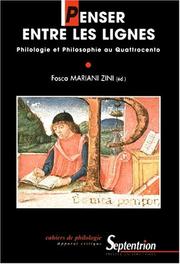

ISBN: 285939625X 2757422030 Year: 2020 Volume: 19 Publisher: Villeneuve d'Ascq : Presses universitaires du Septentrion,
Abstract | Keywords | Export | Availability | Bookmark
 Loading...
Loading...Choose an application
- Reference Manager
- EndNote
- RefWorks (Direct export to RefWorks)
Ces études soulignent le caractère novateur, dans la pensée du Quattrocento, de la philologie, en tant qu’art de la critique et de l’interprétation des œuvres. La philologie se traduit par un retour réfléchi aux sources, entrepris dans une perspective que l’on peut déjà qualifier d’"historique" : la tradition cesse d’être le lieu d’une autorité incontestable pour devenir l’objet d’un examen critique. Les humanistes sont ainsi, par le biais de la philologie, les premiers véritables historiens de la philosophie : plus que des thèses immuables, les différents mouvements de pensée lèguent des problèmes et des objets de controverse. Ainsi, être "platonicien" ou "aristotélicien" ne signifie pas adhérer inconditionnellement à une "école" ou à une "secte", mais s’insérer dans une tradition de pensée où la restitution et l’interprétation de ses œuvres vont de pair avec l’autonomie du jugement critique et le renouvellement de la réflexion.
Philosophy, Renaissance --- Humanism --- Italian philology --- Philosophy, Italian --- Philosophie de la Renaissance --- Humanisme --- Philologie italienne --- Philosophie italienne --- Valla, Lorenzo, --- Philology --- -Philosophy, Medieval --- Medieval philosophy --- Scholasticism --- History --- Philosophy, Medieval. --- History. --- Philosophy, Medieval --- Methodology --- Philosophy [Renaissance ] --- Italy --- Valla, Lorenzo --- philologie --- philosophie --- Quattrocento
Book

ISBN: 3110648164 3110638770 9783110638776 9783110648164 9783110635775 3110635771 3110635771 9783110635775 Year: 2019 Volume: 62 Publisher: Berlin Boston
Abstract | Keywords | Export | Availability | Bookmark
 Loading...
Loading...Choose an application
- Reference Manager
- EndNote
- RefWorks (Direct export to RefWorks)
Beyond Reception applies a new concept for analyzing cultural change, known as ‘transformation', the study of Renaissance humanism. Traditional scholarship takes the Renaissance humanists at their word, that they were simply viewing the ancient world as it actually was and recreating its key features within their own culture. Initially modern studies in the classical tradition accepted this claim and saw this process as largely passive. 'Transformation theory' emphasizes the active role played by the receiving culture both in constructing a vision of the past and in transforming that vision into something that was a meaningful part of the later culture. A chapter than explains the terminology and workings of 'transformation theory' is followed by essays by nine established experts that suggest how the key disciplines of grammar, rhetoric, history, poetry, and philosophy in the Renaissance represent transformations of what went on in these fields in ancient Greece and Rome. The picture that emerges suggests that Renaissance humanism as it was actually practiced both received and transformed the classical past, at the same time as it constructed a vision of that past that still resonates today.
Humanism --- History. --- History --- E-books --- Classical tradition. --- Reception studies. --- Renaissance humanism.
| Listing 1 - 10 of 10 |
Sort by
|

 Search
Search Feedback
Feedback About UniCat
About UniCat  Help
Help News
News